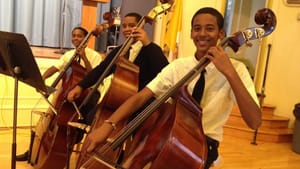Stay in the Loop
BSR publishes on a weekly schedule, with an email newsletter every Wednesday and Thursday morning. There’s no paywall, and subscribing is always free.
New music for an old struggle
Orchestra 2001's Martin Luther King concert

Richard Danielpour limited himself to a brief description of his new clarinet concerto. In the program notes for the Orchestra 2001 concert in honor of Martin Luther King, Danielpour said he thought of the orchestra as a congregation and the clarinet soloist as a pastor narrating the last year of Dr. King’s life.
Danielpour’s capsule description reminded me of Beethoven’s famous comment on his Eroica symphony: “to celebrate the memory of a great man.” Like Beethoven, Danielpour gave his audience all the information they needed. He provided us with the overall aim of the concerto and let us respond to its moods. He didn’t limit our reactions with a detailed program that linked each section of the music to a specific event.
The big bangs on the percussion a third of the way through could represent the shots that killed Dr. King, or the way the news hit most of us when we heard it. The beautiful slow movement is clearly an elegy. But what does the cheerful, jazzy first movement represent? King’s roots in Southern culture? The people who chose him as their representative when the Civil Rights movement began in Alabama? That’s up to you. Works of art are always more effective when the creator lets the audience fill in some of the blanks.
Danielpour’s concerto shares another quality with the Eroica and most of the best pieces associated with extra-musical subjects — you could listen to it simply as a beautiful, moving piece of music even if you had never heard of Martin Luther King. Danielpour exploits the full range of the clarinet’s expressiveness and the variety of colors a good performer can draw from a simple tube.
Danielpour started with the great advantage that he wrote the concerto for one of the most talented and artistic performers on the concert circuit. Anthony McGill gave the premiere a performance that moved, effortlessly and gracefully, through moods that ranged from the assertive riffs of a jazz player to the understated expressiveness of a good storyteller.
The other major premiere on the program should have been more effective than it was. Jay Fluellen’s A Voice Cries Out: Dare to Love combined a gospel choir with an orchestra and a jazz trio. Fans of the Philly Pops tell me the Gospel Choir of the African Episcopal Church of St. Thomas can electrify Verizon Hall, but Fluellen didn’t let them reach their potential. His instrumental writing was moving and effective, but his choral writing sounded routine. The choir didn’t come alive until the end, when Fluellen gave them some lyrical counterpoint, and they showed what they could do with sparkling, more complex material.
An unspoken message
Most of the items on the Orchestra 2001 program contained unspoken statements. The most important of these came from the pieces that featured the young musicians in the Play On, Philly! orchestra.
Play On, Philly! is a West Philadelphia music education program that provides free music lessons to children “from communities that have little access to music education.” The children study three hours a day after school, Monday through Friday. The program works with children in grades K-11, and most of the 45 students assembled on the Perelman stage looked like they came from the younger sections of that range.
The second half opened with the Play On, Philly! wind ensemble playing a march-style Fanfare for Winds by Philadelphia composer Sheridan Seyfried. The POP orchestra then joined members of the Orchestra 2001 ensemble in a Symphony in the Key of Unity — a series of themes created by 12 students in the POP composition class and arranged by one of their teachers, Joseph Hart.
The result of this massive collaboration was a fast-paced, well-orchestrated piece that hopped from theme to theme like a light playing over fragments of colored glass.
The best example of an unspoken statement took place when Anthony McGill joined the students in instrumental arrangements of Lift Every Voice and Sing, Amazing Grace, and The Battle of Jericho — three hymns with deep links to the epic ongoing struggle commemorated on our youngest national holiday. Anthony McGill is one of the small number of African-American instrumental musicians who have graduated from the Curtis Institute of Music. He is a rarity because of “pipeline problems,” to use a term favored by the experts who study these matters: There aren’t enough African-American music students in the educational pipelines that lead to Curtis and the other major conservatories.
To become a professional string player, you must start taking lessons around the time most kids are learning to read. Most African-American children don’t have that opportunity. Play On, Philly! is part of a national network that is rectifying that deficiency. The children are acquiring skills that will enrich their lives as long as they live, whatever they do vocationally. And the rest of us will get to hear more musicians like Anthony McGill.
What, When, Where
Orchestra 2001, New Music in Celebration of the Life of Dr. Martin Luther King, Jr.: Higdon, Celebration Fanfare. Danielpour, Clarinet Concerto “From the Mountaintop”. Seyfried, Fanfare for Winds. Play On, Philly! composition students, Symphony in the Key of Unity (arr. Hart). Johnson, anon., Spiritual Medley (ar. Hart, Seyfried). Fluellen, A Voice Cries Out: Dare to Love. Anthony McGill, clarinet. Gospel Choir of the African Episcopal Church of St. Thomas. Play On, Philly! Orchestra. Orchestra 2001. James Freeman, Joshua Popejoy conductors.
Sign up for our newsletter
All of the week's new articles, all in one place. Sign up for the free weekly BSR newsletters, and don't miss a conversation.

 Tom Purdom
Tom Purdom